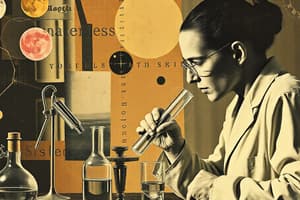Podcast
Questions and Answers
Which of the following is a way scientists share research findings?
Which of the following is a way scientists share research findings?
- Peer-reviewed journals (correct)
- Dreams
- Fortune telling
- Rumors
What is the purpose of science education?
What is the purpose of science education?
- To reduce scientific literacy
- To promote problem-solving skills (correct)
- To limit decision-making abilities
- To discourage critical thinking
What does informed consent ensure in research studies?
What does informed consent ensure in research studies?
- Participants understand the risks and benefits and voluntarily agree to participate (correct)
- Participants are required to participate regardless of risks
- Participants are coerced into participating without their consent
- Participants remain uninformed about potential risks
What is the primary goal of science?
What is the primary goal of science?
What is a key characteristic of pseudoscience?
What is a key characteristic of pseudoscience?
What type of evidence does science primarily rely on?
What type of evidence does science primarily rely on?
Which of the following examples is considered pseudoscience?
Which of the following examples is considered pseudoscience?
Which of the following is a crucial aspect of scientific investigations?
Which of the following is a crucial aspect of scientific investigations?
What does open science promote?
What does open science promote?
What is the attitude of questioning and critical evaluation in science known as?
What is the attitude of questioning and critical evaluation in science known as?
What is one way the public can get involved in citizen science?
What is one way the public can get involved in citizen science?
What does data integrity refer to in ethical considerations?
What does data integrity refer to in ethical considerations?
What is the first step in the scientific method?
What is the first step in the scientific method?
Which branch of science studies living organisms?
Which branch of science studies living organisms?
Which branch of science deals with the composition, structure, and properties of matter?
Which branch of science deals with the composition, structure, and properties of matter?
What are well-substantiated explanations of the natural world, based on a large body of evidence, known as?
What are well-substantiated explanations of the natural world, based on a large body of evidence, known as?
What do you call the application of scientific knowledge for practical purposes?
What do you call the application of scientific knowledge for practical purposes?
Which field of science explores the human mind, behavior, and mental processes?
Which field of science explores the human mind, behavior, and mental processes?
Flashcards
Science in Decision-Making
Science in Decision-Making
Using science to guide choices in areas like health, environment and climate.
Scientific Communication
Scientific Communication
Sharing scientific findings, ideas, and insights with scientists and the public.
Peer-Reviewed Journals
Peer-Reviewed Journals
Publications where research is reviewed by experts before publishing.
Informed Consent
Informed Consent
Signup and view all the flashcards
Animal Welfare
Animal Welfare
Signup and view all the flashcards
Pseudoscience
Pseudoscience
Signup and view all the flashcards
Interdisciplinary Research
Interdisciplinary Research
Signup and view all the flashcards
Open Science
Open Science
Signup and view all the flashcards
What is Science?
What is Science?
Signup and view all the flashcards
What is Empirical Evidence?
What is Empirical Evidence?
Signup and view all the flashcards
What is Objectivity?
What is Objectivity?
Signup and view all the flashcards
What is Skepticism?
What is Skepticism?
Signup and view all the flashcards
What are the steps of the Scientific Method?
What are the steps of the Scientific Method?
Signup and view all the flashcards
What is Biology?
What is Biology?
Signup and view all the flashcards
What is Chemistry?
What is Chemistry?
Signup and view all the flashcards
What is Physics?
What is Physics?
Signup and view all the flashcards
What are Scientific Theories?
What are Scientific Theories?
Signup and view all the flashcards
What are Scientific Laws?
What are Scientific Laws?
Signup and view all the flashcards
Study Notes
The provided text is identical to the existing notes. No updates are necessary.
Studying That Suits You
Use AI to generate personalized quizzes and flashcards to suit your learning preferences.



